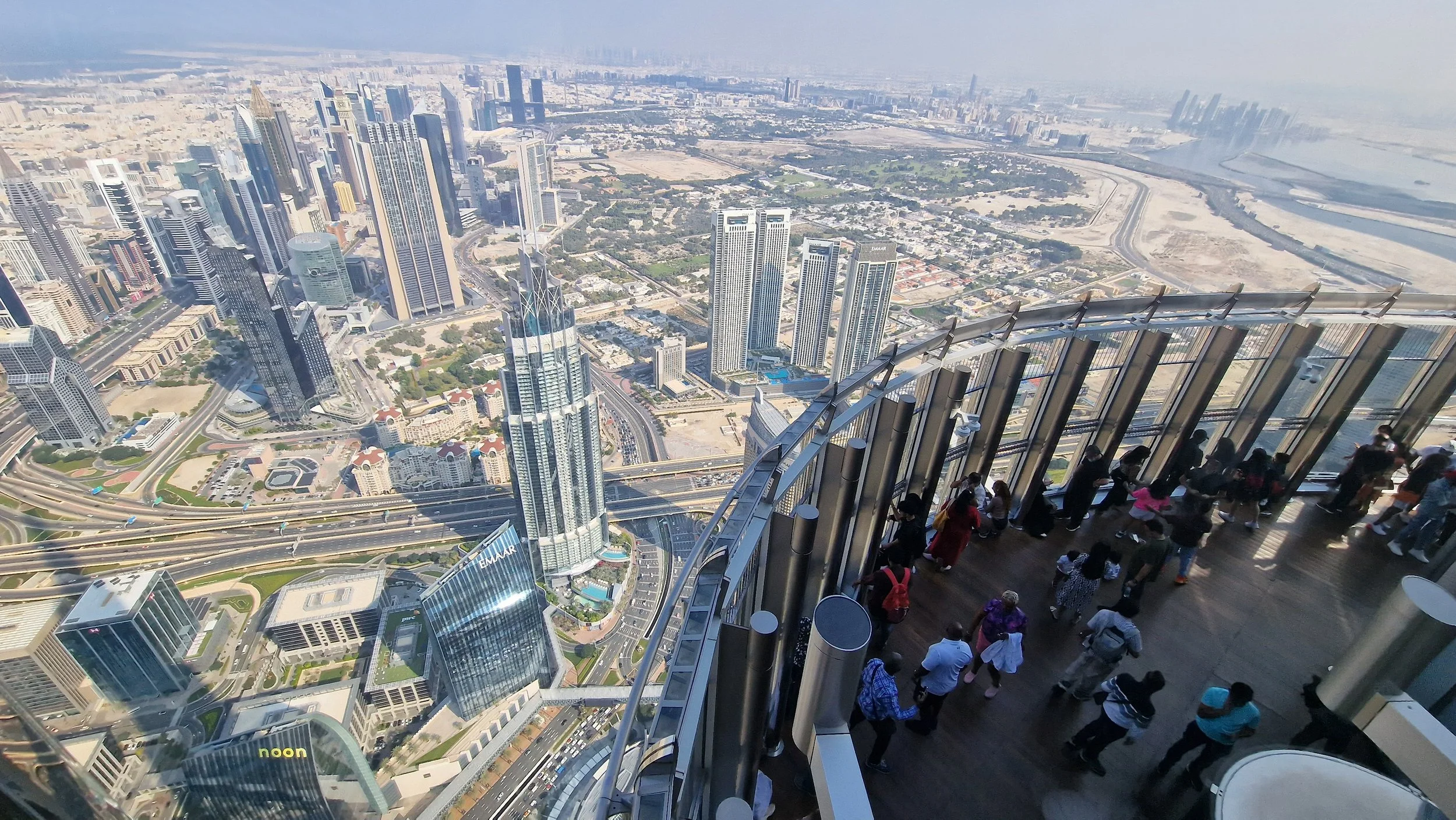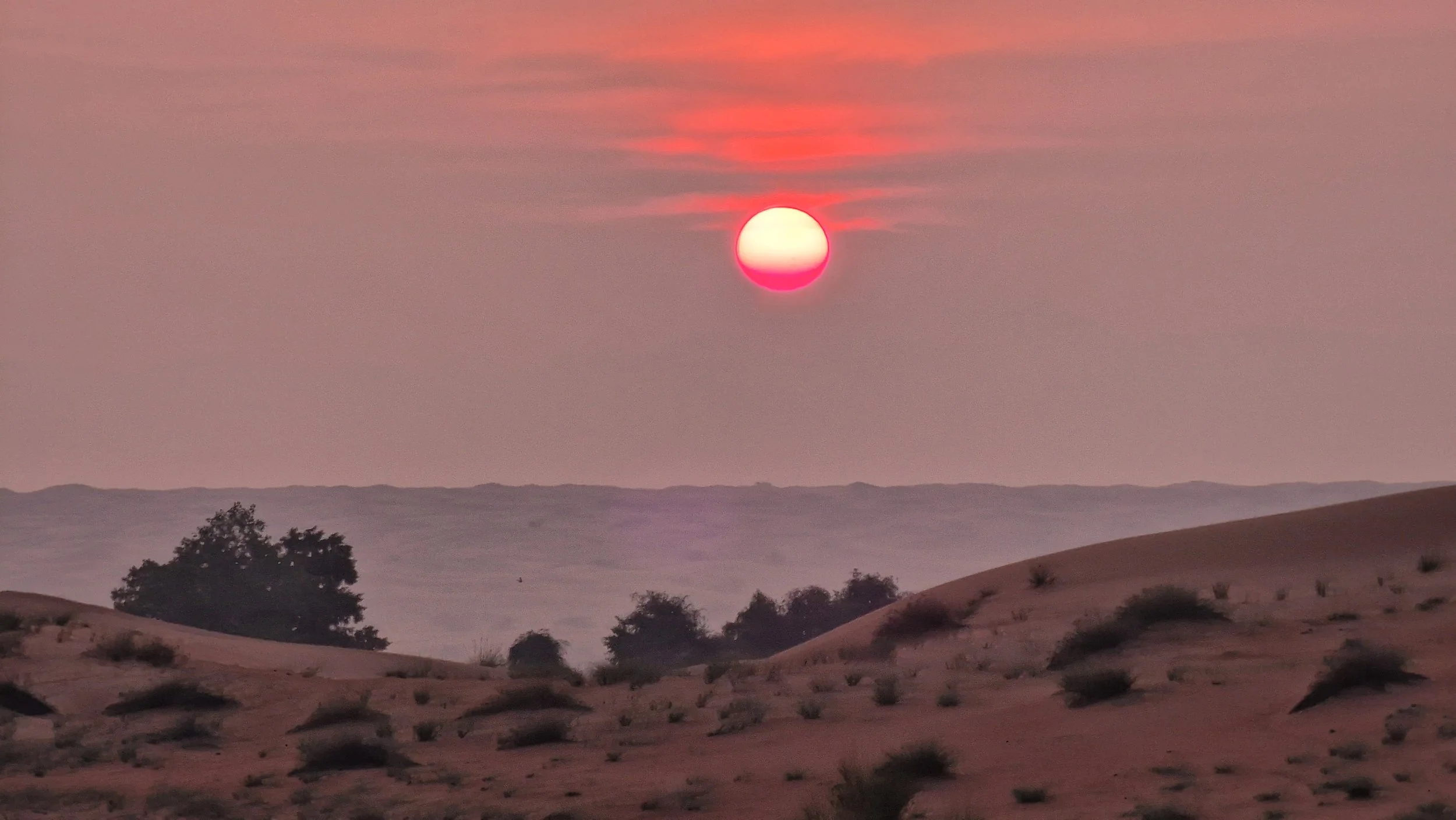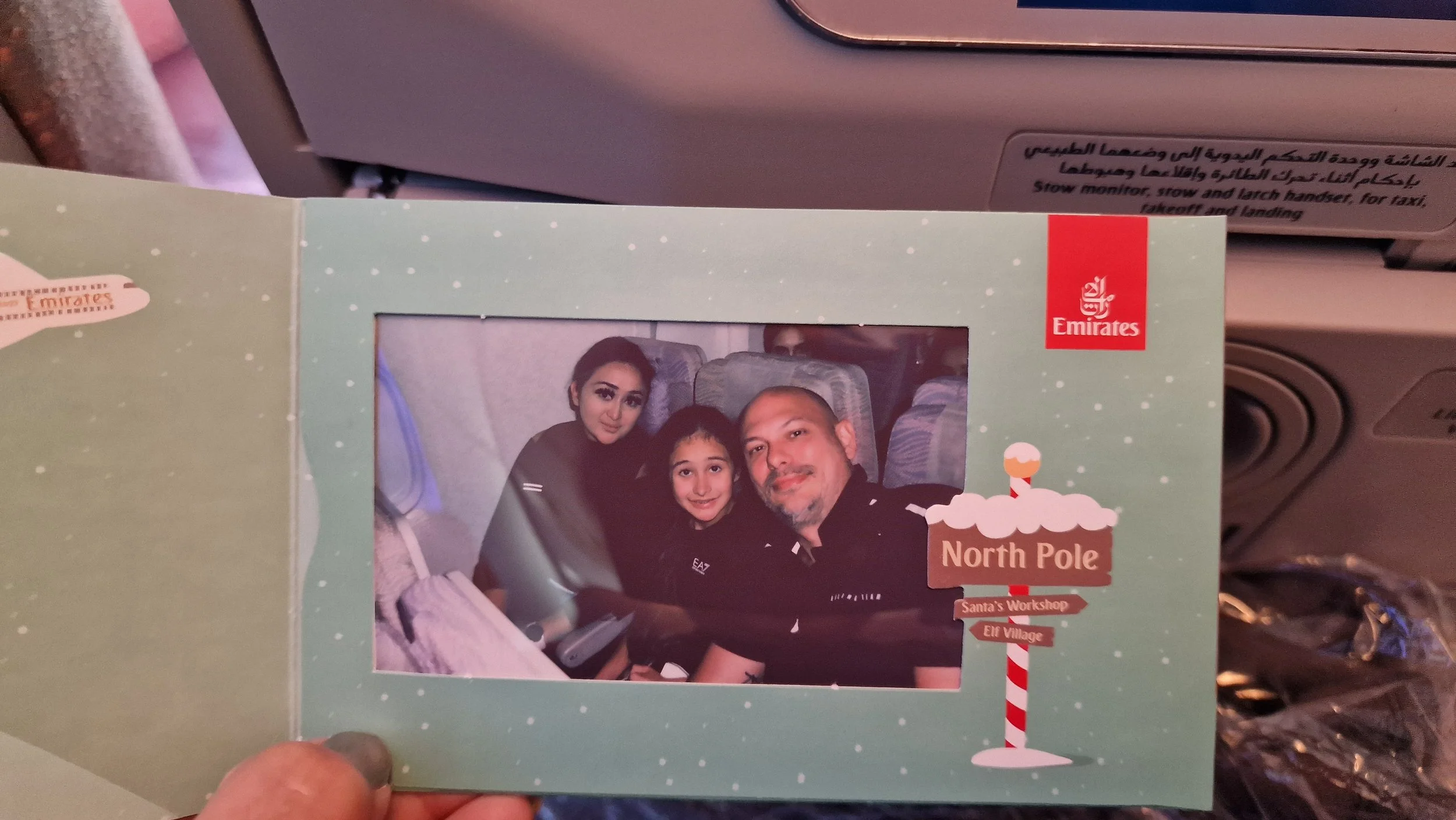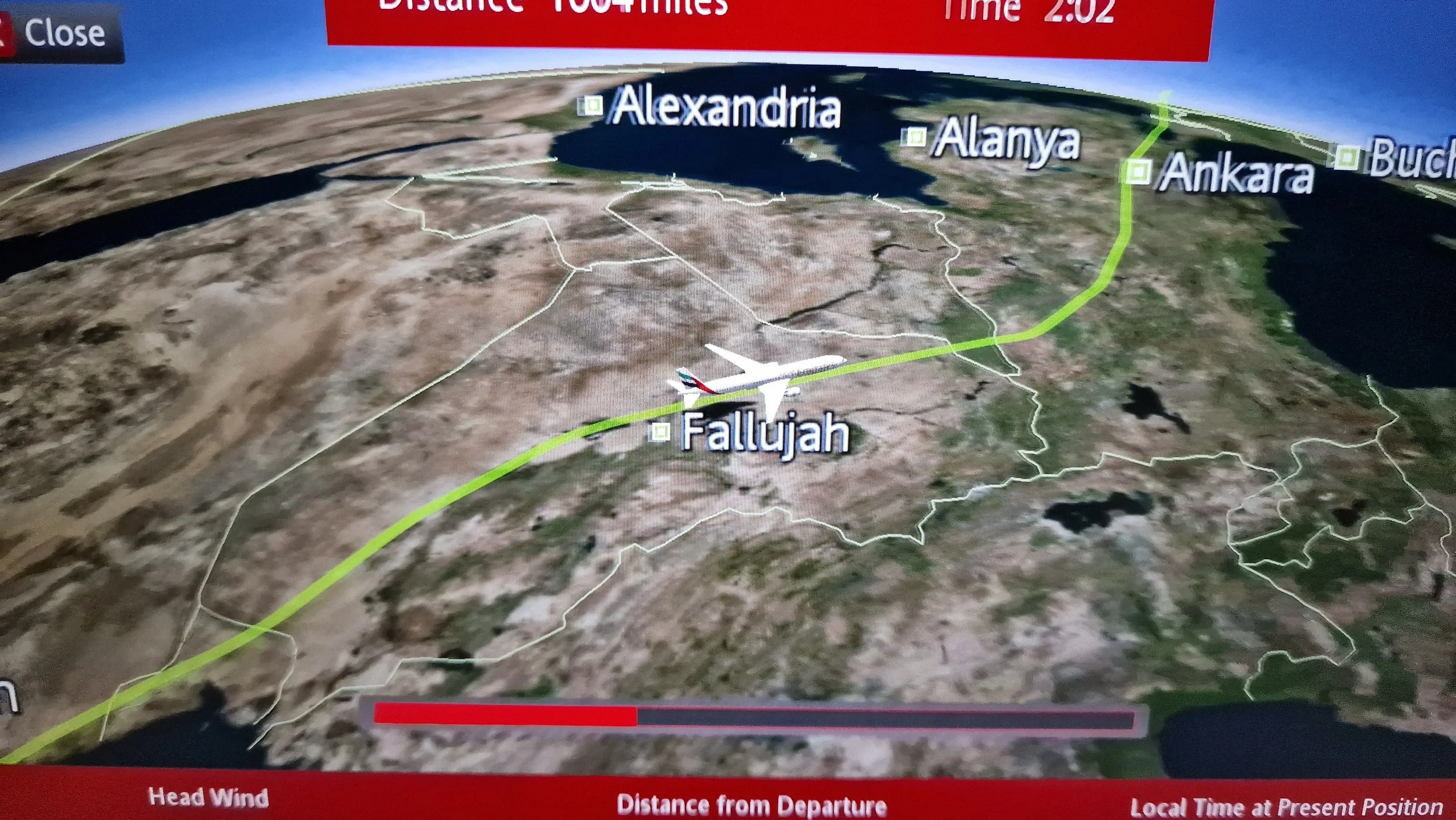Sky-High in Dubai
Going desert deep and pushing the limits of architectural elevation in the UAE.
Marhaba, habibi…
We left Florence in a blur of cypress shadows and espresso foam, pointed south to Rome with the quiet assurance of people who’ve packed too many chargers and exactly one swimsuit that will inevitably be wrong. Fiumicino greeted us with its usual choreography of rolling suitcases and whispered updates on gate changes, and for once, the traffic in Rome didn't stop us from being early. In the lounge, the coffee tasted like competence and we pretended to be the kind of family that didn’t eat their weight in complimentary snackettini.
Alex, inscrutable in that “I have a surprise but won’t ruin it” way, waited until boarding to confess he’d upgraded us to Business Class.
In-flight dinner and watching an old Russell Peters stand-up special
Airbus wide-body, lie-flat beds—the sort of thing that makes you momentarily believe in a benevolent universe. Dinner was lavish enough to require silverware decisions and an internal monologue about restraint. Then the flight attendants tucked us in like kindly strangers from an old world where people are tender with one another. I watched the moving map pivot over Iraq, a quiet hum filling my ears. I could hardly sleep.
It’s strange to look down at a country where you once looked up, to let the past flare and fade in the dark like a matchstick. Ads for Saudi tourism rolled on loop, aspirational desert minimalism and glossy smiles. “Thank Ronaldo,” Alex grinned, as if a transfer window could be the hinge on which the century swings. Maybe he’s right. Stranger things have reordered the world.
Our daughter glanced back and forth to the window and her flight tracker at touchdown, seeing only silhouettes and promise. “I want to live here,” she declared before we even hit immigration. “It feels like the future.” My little Aquarius. “Maybe wait until we leave the airport,” I laughed, tucking a stray curl behind her ear as if that might hold time in place.
W Dubai–The Palm
We reached W Dubai–The Palm before the sun had made up its mind. The Palm Jumeirah felt like someone sketched a dream in the sand and dared the sea to wash it away. The hotel took our bags and handed us the morning—breakfast by the pool, the skyline in the distance like a neon EKG.
Breakfast by the pool
Then the sunrise arrived in that dusty rose-and-orange gradient I remembered from Iraq, a color that lives in the throat. We ate too many pastries, chased it with very serious coffee, and watched the city blink awake. Early check-in turned into a suite, which felt euphoric and vaguely sinful so early in the day. Our room looked out over a blue that seemed designed rather than born.
That afternoon, we faced the Burj Khalifa the way sailors must have once faced cliffs—awed and a little suspicious. We’d skipped the lines (bless the logistics gods) and took the elevator to the Sky levels—124, 125, then 148—ears popping, pulse steadying. From up top, Dubai looked like somebody gave geometry a blank check.
The view from the Burj Khalifa
Roads braided, towers marched, and the desert glowed beyond it all like an argument you can’t win. It was impossible not to admire the audacity—what happens when a city decides the horizon is a suggestion. We drifted through the Dubai Mall afterward, that sprawling cathedral to consumption where aquariums double as meditations and designer boutiques hum like beehives. It’s absurd and hypnotic; it’s also an air-conditioned miracle.
Lunch that afternoon was Lebanese, facing the fountains as they rose and curled in choreographed arcs—the Bellagio on steroids, sure, but less kitsch and more ballet. We ate mezze that tasted like the word “generous”—hummus silk, fattoush with the right snap, tea that made conversation slow down. When the water shot into turquoise sky under the Burj’s shadow, a little girl at the next table gasped. I understood.
Dubai Mall
In the taxi back, both Alex and our daughter drifted into that soft, slack-mouthed sleep that travel grants the deserving. I watched the city slide by—glass and light and cranes like prayer hands—and wondered what it says about a place that builds this fast. Maybe that it believes in itself. Maybe that it’s terrified not to.
Back at the W, the front desk smiled and said, We’ve upgraded you. I pretended to be the kind of person who hears that regularly. The suite was elegant and dark, the kind of room that thinks it knows your better self. We sank into it—views for days, a sofa that forgives, and the quiet thought: If this is the future, maybe it’s okay to hope.
We ate close—Japanese at the hotel—because jet lag had reduced our vocabulary to “yes, thank you” and “more miso.” Service that felt like choreography, sashimi that dissolved, and the skyline winking like it knew secrets about our lives we hadn’t learned yet.
Sunrise and Falconry
The next morning started at 03:30. The kind of wake-up where your mouth tastes like a sentence you didn’t finish. Small-Group Falconry and Safari out near the Al Maha reserve. Our guide detoured to a camel racetrack, explaining how these animals are threaded through the culture—speed, endurance, a kind of regal obstinacy. Then the desert—wide, pale, and waiting—opened before us, the sunrise pouring over the Hajar as if someone had tilted the world.
Local coffee and dates in the cooler air, our hands warming around small cups, the guides talking conservation and wildlife with a reverence that made the place feel holy. Sheldon the owl stole the show during the falconry—solemn, outrageous, faintly judgmental. Falcons cut the air like they’d invented it. I stood there and felt something unbutton in my chest.
I’m in love
Breakfast at Al Maha was its own dream—oryx in the distance like moving punctuation, a buffet that beckoned you to try everything. Our daughter dared me to try camel’s milk. I did, because once you’ve said yes to life in a few unfriendly corners of the world, you tend to keep saying yes. I liked it—sweet, a bit grassy but an almondy aftertaste—and tipped some into my espresso. She grimaced like I’d committed a war crime. “It’s an acquired taste,” I told her. “When you’re truly hungry, you’ll be open to anything.” It sounded scarier than I meant. But truth doesn’t always arrive soft.
Al Maha Resort
On the drive back, both of them slept again, faces open, breath steady. I suggested our guide could turn on the radio or music of his preference. He shook his head kindly. “I like to listen to the desert,” he said. So we did. Silence with texture, the hum of the tires, the way your own thoughts sound different when the land is flat and honest. Gratitude, like a warm stone in the pocket.
By late afternoon, the pool called us back, chlorinated bliss and sun that turned the day to honey in late December making the vacation feel like a comfortable summer. That night, City Social—perched high, with views that make you forgive a lot. It sits in a more residential-feeling part of Dubai, canals and promenades glinting below, an urban hush that isn’t quite silence. The room walked a line between polished and moody, the kind of lighting that flatters both food and memory. Plates landed that were more composition than accident—clean lines, deep flavors, a kitchen that knows exactly what it’s doing. From our table, the city unspooled—glass constellations, roads like arteries, the occasional shimmer of water threading the scene. We ate dessert slowly, because some nights should refuse to end.
Saturday, we signed up for the Dubai Aladdin Tour through the souks and Old Dubai—just us and our guide. Old boats winked along the Creek, the air thick with spice and nostalgia. The souks were theater and hustle—the salesmen volleying guesses at my origin like it was a game show. Russian? Moroccan? The audacity was almost charming.
Alex laughed. “You could be either.” As a mixed-race woman, I’ve grown used to being a mirror for other people’s guesses. It was less “Aladdin” and more “anthropology with samples,” but worth it for the layers—ginger-scented corridors, bolts of fabric like sunsets, and a reminder that commerce is its own ancient language.
That night, CÉ LA VI perched us in front of the city’s money shot: the Burj lit like a sermon. The dining room was all polished edges and swagger, the terrace a runway for dreams of flight. Cocktails that were more argument than drink—in a good way—and a menu balancing Southeast Asian verve with Dubai gloss. Chili heat meeting citrus lifts, a ribeye that tasted like someone had given fire a PhD, and desserts that nudged nostalgia without sliding into cliché. Between courses, we leaned into the view, the fountains punctuating the night, and I wondered if awe counts as a nutrient.
Dinner and a show
Christmas Eve found us back in the desert, this time for the crowd-pleasing safari—live dancing, dinner under a sky that felt closer than usual. Camels groaned and lowered themselves with the resignation of seasoned professionals. The food was plentiful, the dancing earnest, and our daughter’s delight unfiltered. We rode under a Waxing Gibbous in Gemini, the evening pausing us mid-sentence.
Christmas Day: Atlantis water park. We surrendered to the slides, the soft roar of chlorinated rebellion, the way a day can simplify itself into laughter and sunscreen.
Atlantis Water Park
The water park seemed to stretch endlessly, a labyrinth of twisting slides, lazy rivers, and shimmering pools that beckoned with their promise of fun. Each turn revealed something new—a hidden cove, a daring drop, or a cascade of water that caught the sunlight just right. We refueled with some of the best fried chicken we had tasted, crispy and perfectly spiced, fueling yet another plunge into the aquatic adventure. As the daylight began to wane, we transitioned effortlessly into the magic of the aquarium inside Atlantis. Giant glass walls revealed mesmerizing underwater worlds, where sharks glided gracefully, and schools of fish moved with choreographed precision. The quiet hush of the aquarium wrapped up the day in wonder, leaving us in awe of the ocean's mysteries.
Global Village
Later, Global Village—Dubai’s thesis statement on the pluralism of appetite. Pavilions pulsed with music and sales pitches, fabrics and sweets and souvenirs that insisted on their own stories. It’s a carnival of cultures with a government seal of approval, yes, but also a place where you can eat Persian food that makes you want to write your mother, then drift past a light show loud enough to rearrange your cells. We ate well—sumac on the tongue, saffron in the air—and watched people become their best versions: curious, kind, willing to try something that wasn’t built with them in mind.
Emirates Polaroid
On our last morning, the airport lounge felt like a holding pattern between two lives. On the flight back to Rome, I watched Asteroid City and took photos out the window—Turkey’s folds like a rumpled map, Iraq a patchwork of memory and geography. The plane carved its white line and I let my mind drift to where the desert had made space—space to think, to love the exact humans next to me without hedging, to remember that the past can be honored without being rehired.
Memories of another timeline, another life.
Dubai surprised me. I expected spectacle and found it; I also found quiet mornings by water that looked custom-designed and felt restorative, a city audacious enough to make the future feel negotiable, and a desert that reminded me some truths don’t move even when everything else does. We ate like celebrants, slept like the forgiven, and stood together in places built to be admired. Somewhere between falcon wings at sunrise and neon spires at night, I felt the needle twitch—north, or close to it.
We flew home fuller, brighter around the edges. If the future lives anywhere, it lives in cities like this—part wish, part will, part unapologetic attempt. And in deserts too, where the wind scrubs you down to the person you might still become.














